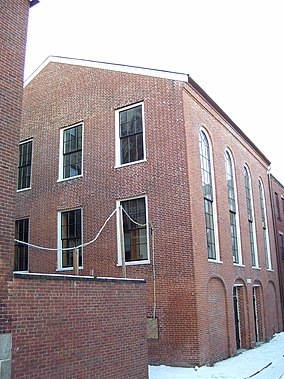Boston African American National Historic Site
| Boston African American National Historic Site |
|
|---|---|

The African Meeting House in Boston, built by African Americans in 1806
|
|
| Location | Boston, Massachusetts, United States |
| Nearest city | Boston, Massachusetts |
| Coordinates | 42°21′36″N 71°03′53″W / 42.36000°N 71.06472°WCoordinates: 42°21′36″N 71°03′53″W / 42.36000°N 71.06472°W |
| Area | 0.18 acres (0.073 ha) |
| Established | October 10, 1980 |
| Visitors | 327,921 (in 2011) |
| Governing body | National Park Service |
| Website | Boston African American National Historic Site |
The Boston African American National Historic Site, in the heart of Boston, Massachusetts's Beacon Hill neighborhood, interprets 15 pre-Civil War structures relating to the history of Boston's 19th-century African-American community. These include the 1806 African Meeting House, the oldest standing black church in the United States.
The historical site is located on Beacon Hill, a neighborhood just north of the Boston Common. The site was designated in 1980 to "preserve and commemorate original buildings that housed the nineteenth-century free African-American community on Beacon Hill." That year President Jimmy Carter signed bills authorizing this and the Martin Luther King, Jr. National Historic Site, as well as one to establish the National Afro-American Museum and Cultural Center in Wilberforce, Ohio. He said:
The two bills that I will sign today represent a three-pronged effort to preserve a vital, but long neglected, part of American heritage; the history and culture of Americans of African ancestry and their role in the history of our nation.
Boston's first African residents arrived as slaves in 1638 with early colonists. Over time, more of their descendants were born free to white mothers; in other cases slaveholders freed slaves for service. After the American Revolutionary War, Massachusetts effectively abolished slavery by the terms of its new constitution. By the 1790 census, no slaves were recorded in Massachusetts. African Americans became activists in the abolition movement, also working to gain racial equality and educational parity with whites. They engaged in political processes to meet their objectives.
...
Wikipedia



